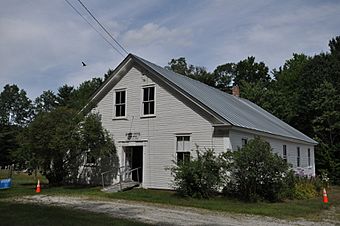Newbury Town House facts for kids
Quick facts for kids |
|
|
Newbury Town House
|
|
 |
|
| Location | Scotch Hollow Rd., Newbury, Vermont |
|---|---|
| Area | 0.7 acres (0.28 ha) |
| Built | 1839 |
| Architectural style | Greek Revival, Federal |
| NRHP reference No. | 83003213 |
| Added to NRHP | July 28, 1983 |
The Newbury Town House is a historic government building located on Scotch Hollow Road in Newbury, Vermont. Built in 1839, it is a great example of an early Greek Revival style town hall that has been well-preserved. It was added to the National Register of Historic Places in 1983. Even though it's no longer used for big town meetings, the town still owns it. It's used for other important community events, like elections.
Contents
What is the Newbury Town House Like?
The Newbury Town House is found near the middle of Newbury, in a quiet, rural area. It sits on the east side of Scotch Hollow Road, between two cemeteries. The building is a simple, one-story structure made of wood. It has a pointed roof, wooden siding, and a stone foundation.
Special Features of the Building
The most interesting part of the outside is its main entrance. It has tall, flat columns called pilasters. These columns reach up to decorative blocks with circular designs. Above the door, there's a special header with a raised middle section. The pilasters also have detailed Greek Revival patterns. Inside, you can still see the original benches, which look a bit like church pews. The lower part of the walls has rustic wooden panels.
Why Was the Town House Built?
The Newbury Town House was built in 1839. Before this, town meetings were held in people's homes or barns. The town needed a central place for everyone to gather. Charles George donated the land for the building and even gave some of the wood needed to build it.
Architectural Style and Changes Over Time
The design of the entrance was inspired by patterns from a famous architect named Asher Benjamin. The building has not changed much over the years. It has mostly only had basic upkeep and small repairs. While it's no longer the main place for town meetings, it is still used for voting and other community gatherings.



